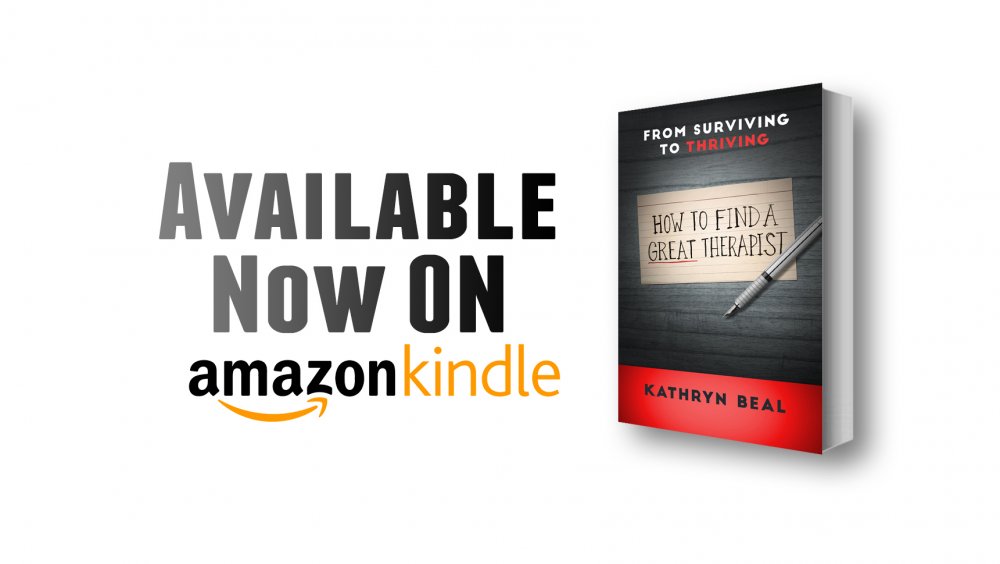-
Posts
104 -
Joined
-
Days Won
16
kathryn last won the day on August 2 2017
kathryn had the most liked content!
Contact Methods
-
Website URL
https://kathrynbeal.net/
Profile Information
-
Gender
Female
-
Location
California
-
Occupation
Homemaker
kathryn's Achievements
Newbie (1/14)
246
Reputation
-
While finding a red-pilled / FDR therapist can be nice, it's not necessary to achieve your personal growth goals. A therapist with similar values, like a Christain therapist, for instance, is an option in a small town. That being said I have heard Max Tsymbalau is good, and he offers online sessions. http://www.maxcounseling.com/ If you're looking for general tips on finding a great therapist check out my book: https://www.amazon.com/How-Find-Great-Therapist-Surviving-ebook/dp/B0713XF6DN/ref=sr_1_1?ie=UTF8&qid=1499877540&sr=8-1&keywords=how+to+find+a+great+therapist
-
Hi, guys! I wrote a book titled How to Find a Great Therapist, and I'd love if y'all would check it out. It's only 99 cents! The inspiration for writing this book came, in large part, from the many stories I heard on these boards about your struggles to find a good therapist. I also have FAQ at the end which consists of questions that came exclusively from FDR listeners. It's available on Amazon here. Please let me know what you think! Book Description: "This book is not just about finding a good therapist. It is about finding a great therapist. The kind of person who will inspire you, challenge you, and change your life. The kind of person who will help you make real progress. "If you are just looking for someone to talk to, this book is not for you. Throw a rock and you will find a mediocre counselor who will gladly take your money, go through the motions of “listening” to you for an hour, week after week, and never encourage you to change. And maybe you don’t want to change. That’s fine. Just check out another book, because this one will only stress you out. "However, if you want to thrive rather than survive, use this book to demystify the often muddled field of psychology. You will learn: How to identify an awesome therapist. How to know if you’ve found a bad one. What to expect from therapy. How to trust yourself. And how to improve your odds of permanent growth. "The author takes her years of “couch surfing,” during which she saw over twenty therapists and coaches, to simplify the process and help you make life changes efficiently and with the support you need. "This short book is jam-packed, full of principles that you can use to feel confident about an often confusing and stressful transition in your life. Make the choice to change your life and find a great therapist."
-
- 7
-

-
- therapy
- self-knowledge
-
(and 3 more)
Tagged with:
-
My husband, Kevin Beal, and I discuss the latest feminist outrage. This time, typing!
-
- 2
-

-

Introducing Myself - Kiwi lady interested in self knowledge
kathryn replied to gneiss81's topic in General Messages
Welcome, Kiwi lady. I think it's courageous for you to put yourself out there so openly. Best of luck dating. There are some really incredible guys in the FDR community. I met my husband right here on the boards! -
Hey, guys. I've started making short videos on YouTube. This one is about the alleged Hollywood pay gap. Let me know what you think! I'm still new at this and working on the technical side as well as what topics to explore. So, I'm open to all the feedback I can get.
-
Dunning-Kruger Effect - Cognitive bias where individuals with very low knowledge of a subject will overestimate their understanding of said subject, creating a false sense of superiority. Simon the Boxer - The tendency to re-create trauma and abuse. This is a maladaptive coping strategy. The concept is explored in RTR [page 80] through the story of a boy named Simon who is the victim of physical abuse as a child only to become a boxer in adulthood. Virtue Signaling - Promoting an idea that is valued within a certain social group in order to gain status. These are empty expressions of virtue without any actual substance, effort, or problem-solving behind it. Example: Changing your profile picture on Facebook to "support" refugees, but neglecting to give any money or offering any productive solutions.
-
Is therapy always right for everyone in every situation? Of course not. Therapy alone isn't a cure-all, but it can be a great resource. For me, therapy has been enormously helpful, but I was also highly motivated and working a lot on my own. Because therapy is self-directed, it's usefulness depends on what you make of it. If you're not really committed, if your heart is not in it, by all means, try something else. Are there bad therapists out there? Hell yes. Just like there are some bad doctors who could misdiagnose you. Does that mean you should never go to a doctor? Hell no. You read reviews, asks lots of questions, and get a second opinion if your gut tells you something is off. Does everyone need therapy? Nope. But if there are major things in your life you are unhappy about, I don't think the notion that a therapist could help you is too outlandish. If you feel a strong resistance to it, why is that? Why did my dad not go to a doctor? When he was feeling weaker and weaker and his abdomen kept growing? He thought he knew better. This pride cost him his life. Now, the stakes are a lot lower on whether or not to go to therapy. Obviously, the consequences aren't life or death if you don't go to a therapist. (Unless you are suicidal, of course.) But the reasons I've heard for not going to therapy that circle around this idea of being too smart, sound eerily like my dad. Something like: "I know what a therapist is going to tell me." or "What can a therapist do for me that I can't do for myself?" or "Therapy is just ____. I just need to do ____." I think a therapist can tell you something you don't know, offer a fresh perspective, and be someone to hold you accountable for your actions. They can help you see connections and patterns in your life that you are too close to see. Their eyes, not necessarily their smarts, can be invaluable. Does that mean you should go to therapy? I don't know. It depends on your needs, goals, and life situation. Worked well for me, though.
-
No one "needs" therapy. The only things you need to do in life is basic bodily functions like breathing and eventually dying. I think there are good arguments for how therapy can help a person thrive rather than just survive, but it is ultimately up to the individual to make the choice. If you are doing well working on your own with your personal development efforts, awesome! Keep doing it. This article was for those who are still struggling. I 100% agree with you about psychiatry and the pharmaceutical industry. If a therapist "strongly recommends" drugs, I generally take that as a red flag and would stay away. You can definitely make therapeutic progress through close relationships with friends and family, but many people don't have that option. Especially the ones who grew up in dysfunctional and abusive families, in which case it's often healthier and more therapeutic to distance yourself from those people. Additionally, using friends as therapists for the long term may put undue stress on a relationship. Boundary issues may come up, and feelings could easily be hurt unless you are consistently reciprocating in some way. I also think that friends and family members are often too close to help. It can be difficult for a loved one to see you in pain. They will want to offer solutions and make you feel better, where a therapist could be more objective and let you feel the pain It can get complicated, and I think it's simpler with a paid therapist, but I'm glad if you have people in your life who are a good support system.
-
Hi, Kavih! This is a short one, but I found this article by Joel Patterson to be really helpful on the subject of self-erasure.
-
Wrote this short article for Self-Knowledge Daily. Find the audio version here and the original post here. Let me know what yall think! You’re Too Smart For Therapy Do you have issues in your life you may need help working through? Are you an intelligent person with ambition, but lack motivation? Have you done lots of research on self-development, listened to hours of podcasts on psychology, and heard recommendations to go to therapy, but still aren’t going? You may be too smart for therapy. This happens in other fields as well. For example, my father was a doctor and a brilliant man. He contributed to medicine in a lasting way; in fact, had he lived, I think he would have won a Nobel Prize. And though this man was a well-respected physician and researcher, you know what he was terrible at? Going to the doctor himself. If you are reading this article, and other articles through Self-Knowledge Daily, you probably know a lot about psychology. You might even know more than a therapist, but it’s not just credentials and knowledge a therapist can provide. It’s perspective. My father didn’t go a to a doctor for over 10 years, until he had to be rushed to the emergency room for renal failure. Fluid secretions had been pooling in his stomach for over a year. Dad had noticed his abdomen was growing, but he diagnosed it as weight gain. He said later he had assumed the belly pouch was just what happened when you got older. So, instead of going to the doctor, he went on a diet. This just made him weaker. He had a preconceived notion about himself: he was prone to weight gain, so this was just his body. Had he gotten the perspective of another physician, even a physician that wasn’t as good of a doctor as him, he might still be alive today. Another doctor could have noticed what dad was too close to see, and that’s what I understand therapy to be: a fresh perspective. A therapist is a collaborator, a mirror, and an advocate for you. Self-therapy can be wonderful, but it’s difficult to see yourself the way another can see you. Most importantly, when you are on your own, your progress is slower. You aren’t going to live forever. If anything can help you live a better life now, why would you delay? My dad was suffering for a year before he sought help, with something a physician could have noticed and treated quickly. One-on-one therapy is more efficient than going it alone. You might very well be smarter than all the therapists in the world, but that doesn’t mean they don’t have something to offer you. Life is short, get the help you need and deserve now.
-
It looks like some of the posts here have disappeared, so just to update everyone, we do have a private group on Facebook! We chat on Google Hangouts every other week or so. It's been wonderful getting to know these lovely philosophical ladies! A very warm and caring group. If you'd like to join us, PM me with your email address and a little about yourself, and I can add you to the Facebook group. We keep it private for a degree of anonymity, so only members of the group can see who is in the group. Let me know if you have any questions!
- 48 replies
-
- 1
-

-
- female
- support group
-
(and 2 more)
Tagged with:
-
Welcome, Jessica! I totally understand the fast love of FDR; I was the same way! I'm curious, what was the video that hooked you? Phew, y'all have had a mighty hot summer there in AZ. There are a few FDR folks who meet up in Phoenix. They post their events on Facebook via the FDR Meetup Event Group. Here's the link: https://www.facebook.com/groups/FDRMeetupEventGroup/ If you are interested in connecting with people over the internets, we have an FDR Women's Group that chats on Google Hangouts every other week or so. Private message me if you'd like to join us sometime! Here's a link to the original thread that started the group, so you can get an idea about the kind of ladies who come to chat. https://board.freedomainradio.com/topic/41818-female-support-group/ Hope to see you around!
-
Thanks, guys! I'm so glad y'all found it useful.
-
New article! Originally published on Medium for Self-Knowledge Daily. 3 Steps to Therapeutic Recovery How to take control of your life When you make the decision to start therapy, the process can be daunting. I started therapy in the spring of 2010, and I had no idea what I was doing. Since then, I’ve been struck over and over with the thought, “Am I doing this right?” I longed for a syllabus on the proper procedure and a straightforward exam at the end, like my college classes. The reality is a lot messier, and I find myself being tested over and over. (Damn you pop quizzes!) It took me a long time to figure out how to be successful in therapy. It’s only been in the last year and a half that I’ve made real progress in my therapeutic journey. And while there is no one size fits all procedure on how to discover who you are, process childhood trauma, and live your core values; I’ve sussed out three general steps that have helped guide me. 1. Cognitive Understand What Happened to You First, you put together your story, piece by piece. Tell the facts of your life to your therapist and write them down in a journal. Go over the facts again and again until you see the whole picture of who and why you are. At first it might be a bit hazy, but once you get started more and more memories will surface. Before therapy, when someone would ask me how my childhood was, an image of me running up a hill in my backyard as a kid, pretending I was Pocahontas, with the wind blowing wildly through my hair, would come to my mind. But this was the only thing I could think of in those moments. I would say some vaguely positive sentiment, but, in truth, I didn’t really know how my childhood was. When I thought about childhood, it was foggy. Like trying to do complex math in your head, the “math” of processing an old event while squaring it with old propaganda requires a lot of mental effort. Writing it out on paper and discussing it with a neutral third party will help you make sense of it. It takes going back to your history, then going back again. Each time you go back, your perception will change. This is especially important as you are learning more about yourself and gain more insights. The key here is knowing what happened to you and accepting it. The memories of my childhood were once hazy because I wasn’t seeing the reality of my history. 2. Emotional Feel Your Feelings This the hardest step. I did not want to do this step. It’s painful, but getting in touch with your emotions is crucial to the therapeutic process. I believe that this step is the key to lasting, lifelong change, not just temporary fixes. The way I was able to approach this very difficult step was going back to step one: cognitive, learning about emotions. I learned that emotions are not good or bad; they are morally neutral. It is never wrong to feel something. As John Gottman so eloquently puts it, “All feelings and wishes are acceptable, but not all behavior is acceptable.” Part of the reason emotions are morally neutral is that they are involuntary responses. We cannot control how we feel about something; we only control how we behave and what actions we take. Feelings are not dangerous. It’s safe to feel whatever you feel. After understanding emotions more, I started being more aware of when I felt things, and I wrote them down. I noticed quickly that there were some feelings I’d try run away from. When anxiety came up, for example, I immediately found something to occupy my mind or keep myself busy. This isn’t a bad tactic for the short term. Sometimes you don’t have time for a strong emotions, just like sometimes you don’t have time for a friend in crisis. But after you finish your work and take care of yourself, you call your friend to check up on her, just as I started doing with my feelings. When I do have the time, and I feel something strong coming on, I either go for a walk or lay on the couch and record an audio file. I let whatever comes up come. I let the emotion talk, sit with the feelings, and explore them. Then I listen back to what I said. I discovered that there were parts of myself who wanted a voice, and when I allowed them to speak freely and tell me what was on their minds, it was easier to work through the feelings and process them. 3. Integration How to Move Forward In this last step, you put all the work together. Through your cognitive process you understand the why and how of who you are. You know your core values and where those come from. With this knowledge you can make intentional and active choices about your future. And with the foundation you gained in emotional awareness, you can now integrate the parts of yourself. Parts of yourself can be emotions speaking up, or it could be that inner critic who always seems to have a problem with what you are doing. (My inner critic sounds eerily like my mother.) When you examine your childhood memories, that’s getting in touch with your child part. You will discover these parts in therapy, through your memories, and through self-negotiation. There may be parts of yourself that you haven’t connected with in a long time. You might be ignoring them because you don’t like what they have to say, or they make you feel anxious, or they just seem like a stranger to you. My friends don’t like it when I ignore them, and your parts don’t like it either. But when you neglect friends, you can at least get a safe distance from them. Your parts, though, are living right there with you. It might sound hippy dippy, but making friends with all the different parts of yourself, through compassion and negotiation, brings inner harmony. I’d been in therapy for a few years before I really committed to it, but when I did dedicate myself to this journey, it was a commitment to uncovering truth and taking ownership of the life I wanted to live. Self-examination can be clouded by personal biases and emotional scar tissue. The work is in knowing those parts so you can operate within objective reality. Being kind and compassionate is essential to being close to someone, and it is essential to being close with yourself. Creating standards brings consistency and security. For instance, a standard I live by is not raising my voice or using pejoratives with myself. If I do violate this rule, I don’t beat myself up, because that would further violate the standard. I take responsibility and get curious. If I call myself stupid for stubbing my toe, the name-calling is like a big stop sign in my mind to slow down and figure out what’s going on. Conclusion Through self-knowledge, emotional awareness, and integrating what you’ve learned (and unlearned!), you have skills to live a life of integrity that will bring lasting happiness. I’m still working towards this goal, but what I’ve gained so far has proven to be the happiest time in my life. Only a few years ago I was living in an inner dictatorship, but now I am starting to see an anarcho-capitalist utopia in my own mind. It’s a work in progress, of course. It takes a lot of focus, research, and practice to maintain a peaceful society up there. But the goal is to have all my parts living by consistent standards for the mutual benefit of everyone, and it’s pretty awesome.
-
It sounds like there are some lack of boundaries happening, which you might be more susceptible to given your history of enmeshment with your mother. For instance, when you called your mother a bad person and your therapist "felt personally affected" by your judgments. This strikes me as highly unprofessional. You are paying this woman to be there for you emotionally and offer support, and she turned this dynamic upside down to make you responsible for her feelings. Now, I don't know the context, of course. Maybe she was saying it as some sort of caveat that she could be biased because of this or something. Also, therapy is a good place to practice RTR. So, if she was saying this as an open dialogue to discuss your feelings and her feelings, it might not be wholly bad. But, given your history of being surrogate husband to your own single-mother, I imagine the therapist most useful to you would be the kind of person who is strong enough to deal with those defensive emotions on her own. (And single mothers in general will not tend to have that sort of forbearance.) Since you grew up with an enmeshed mother, you've probably already had enough practice negotiating with other people over their triggered emotions. You probably could really use a relationship where you don't have to worry about the other person's needs so much. Therapy is not supposed to be an emotionally equal relationship, that's why you are paying her. You can get therapeutic benefits from talking things out with close friends, but you check in with them and reciprocate. That is not the deal with a therapist. The reciprocity is in the monetary transaction at the end of the session. I think creating a healthy bond with a therapist is bolstered by having the boundaries of the one sided nature of the relationship clearly defined. It is a conversation, but fundamentally you guys are both there for you.




